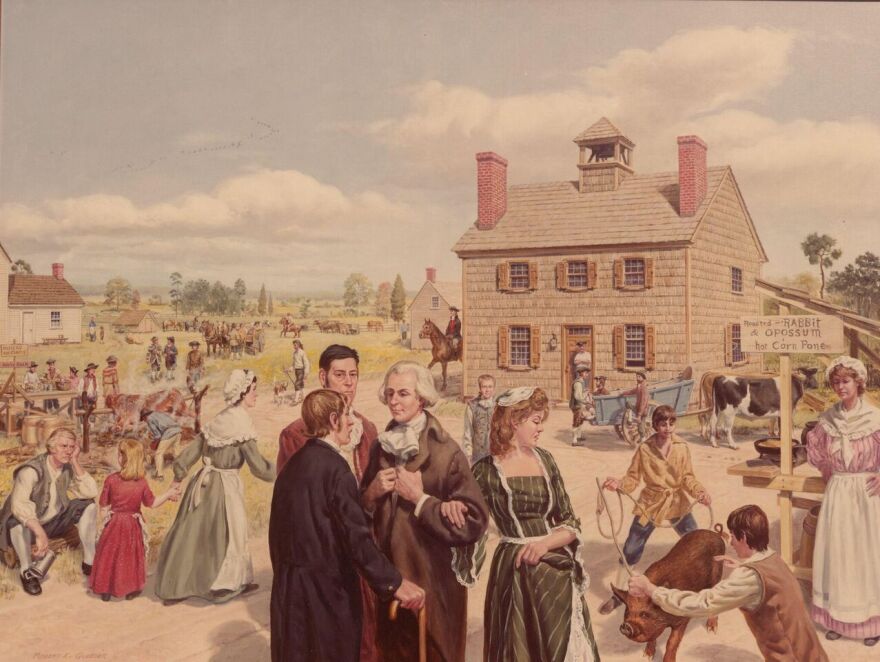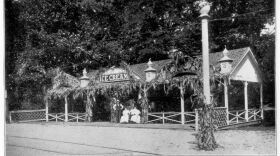Just a few days after this year’s Return Day, I met Rosalie Walls at the Georgetown Historical Society to tour their collection of wagons and buggies in the Marvel Carriage Museum.
“This is the dog closet where they would put the hunting dogs in there when they went on a fox hunt, Walls said. "That’s why it’s so high – so you could see the foxes running through the fields.”
Walls is describing one of around 25 carriages in their collection – which also includes a surrey with the fringe on top, a spreader that would have been ordered from a Sears Roebuck catalog, and even one that originally belonged to Walt Disney.
The museum is named after Mr. Nutter Marvel, a local businessman who made his fortune in the oil and gas business. Nutter purchased over 100 of these buggies to honor the Delawareans who would have used similar modes of transportation to make their way to Georgetown for Return Day in its early years.
“They were driving 15, 20 miles walking or riding horses or oxen or carriages to get here," said James Bowden, President of the Georgetown Historical Society.
Bowden is also a 7th generation Sussex County resident and vice president of Return Day. He has researched the event’s history for years.
“Starting in the early days of elections here in Sussex County the people would return to Georgetown or return to the county seat to actually vote. You return to Georgetown to hear the returns of the election," Bowden said.
That’s right – during the 1800s and early 1900s residents had to travel long distances to the county seat to cast their vote. But Georgetown, Delaware wasn’t always the county seat.
It was in Lewes until 1791, the seat moved to Georgetown to provide a more centrally located destination for travelers.

"Georgetown was known as 16 miles from anywhere," Bowden said. "That's not quite true, but it's close."
And that back story lives on in the name of a brewery just down the road from the Georgetown Historical Society – 16 Mile Brewing. And beer – or livations, as Bowden likes to say – were a big part of Return Day in its early days, too. Early hotels like the Eagle Hotel from 1802 and area taverns would welcome guests while they waited for the election results to come in – which took a couple of days.
“They were quite a noisy crowd by the time Return Day was over," Bowden said.
It was also a sort of seasonal celebration that travelers could afford to make – since it was just after harvest time. Bowden says it’s one of the oldest agrarian – agriculture-related – celebrations in the country.
But as time passed and technology progressed, it wasn’t always necessary to physically travel to Georgetown to vote.
“Back into the 20s and maybe 30s it was starting to go out of vogue a little, because people didn’t have to come," Bowden said. "You had the telephone, you had the telegraph. They were actually seeing what the election results were at home – maybe in the 30s over the radio.”
Despite the inconvenience of making a trip to Georgetown – the tradition continued. That is, until WWII.
"They didn't want to stop their celebration but they didn't want to stop the war production years, either and take up precious metals and commodities that should be for the war efforts," Bowden said.
Bowden says the festival wasn’t held for several years, but returned in 1948 – thanks to Mr. Nutter Marvel.
From that point on, since buggies were “out of vogue” for everyday travelers, Marvel’s collection of carriages was used to carry politicians – both winners and losers – in the Return Day parade.
“We require the people who are campaigning against each other to come together in the carriage and sit in the same carriage as they’re going through the parade," Bowden said. "The tradition is the winner of the election – or that particular part of the election – faces forward, and the loser faces backward.”
Marvel himself led the parade for many years – and when he couldn’t ride a horse easily anymore, he’d ride wagons through the historically Republican tradition of Return Day.
“If the Democrats won they would be the only ones to show up and they would throw a big party with roasting an ox on the circle and giving out free sandwiches," Bowden said. "Conversely, the Republicans if they won they would be the ones to show up and what they would do is they would have a grand parade.”
But today the traditions have merged and are part of every Return Day, regardless of which party wins. And in addition to the parade and party - a ceremonial hatchet is buried in some sand to symbolize a civil end to the election season.
Rosalie Walls has been involved with Return Day since 1972, serving as the event’s president for many years. She finally stepped away last year, but remembers a call she received her first year on the job.
“Hey you better call the fire company because the ox roast stand is on fire," she said. "Being new in this position I said oh, yea, sure right. I thought they were just kidding, and they said no, no we’re serious. Look out the door, look out the door. So I went over to the door and looked and they were not kidding.”
Thankfully everyone was ok – and other years have been much less dramatic.
And while Bowden’s research hasn’t pinned down exactly when Return Day started - he believes it dates back to as early as the 1790s - he has been able to confirm other stories that until now were simply hearsay.
One of his favorites involved Charles Stockley, a farmer and political democrat who served as Delaware’s Governor from 1883 to 1887.
“He was elected Governor, and his grand parade consisted of a boat he actually had taken out of the water and brought to the circle," Bowden said. "They paraded that boat around the circle while he was on top of the boat showing that he was now the Governor of the great state of Delaware," Bowden said.
And despite the drama elections can cause both nationally and locally, Bowden says Return Day is a time for everyone – from both the Democratic and Republican parties – to come back together.
“We can talk," Bowden said. "We find that a lot of the politicians even when they have a really tough election and they’re really not talking to each other during the election – sometimes slinging mud at each other – they will sit down and actually be cordial. And that’s what democracy is all about, and that’s what we’re proud of.”
Seeing those connections in the works Mrs. Walls’ favorite part of Return Day.
“You get to know to all of the politicians from the lowest row office right up to the you know senators and representatives that travel to D.C. and where else but little old Delaware that you would be a able to you know, get to know them very close," Walls said. "They become friends.”
Vice President Joe Biden has been to many a Return Day – even helping the event receive national historical recognition - but there is still one invited guest who’s never shown up.
“We’ve always invited the President," Walls said. "We’ve never had the President show up to Return Day but he certainly would be in a horse and wagon."
And until Return Day is held again in 2018, the hatchet will remained buried in sand from the first Sussex County seat of Lewes, Delaware.
Bowden says he’s not exactly sure how old the sand is, but they don’t replace it every year.
“It’s the sand that’s been passed on over the year," Bowden said. "We seem to not loose any, so that’s great.”










